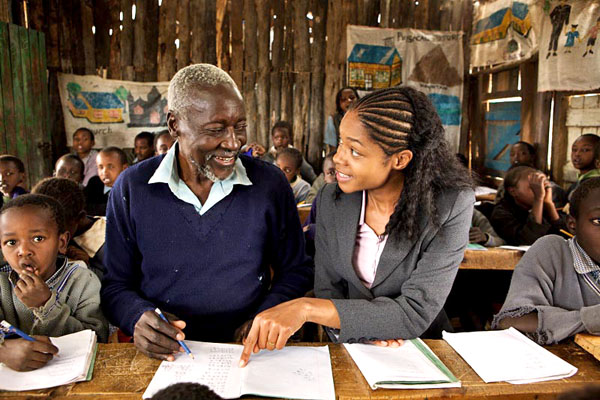|
Reviews of Recent Independent, Foreign, & Documentary Films in Theaters and DVD/Home Video

THE FIRST GRADER The First Grader at first seems like it will just be a charming tale of an old guy’s quest for literacy, like one of Oprah’s touted “The Greatest Lessons” from her show. However, it strikes a higher note: there’s a lot to be learned about a forgotten generation. In rural Kenya in 2003, an octogenarian goat herder hears a radio announcement that the government will now provide free public education. Wrapped in traditional blankets, proud Kimani Ng’ang’a Maruge (Oliver Litondo) limps with his large walking stick and towers over the huge line of rowdy kids registering for class. The harried school administrators protest that school is only for kids, what with too limited resources, and they keep coming up with excuses to keep him out. They insist it’s a primary school, that he needs writing supplies, and a school uniform. He persists that the rules say free education is for all, and he cobbles together a ragged uniform from the laughing women selling used clothing. Trudging back to the school in knickers and high socks, he gets plenty of ribbing from the old guys sitting around drinking (played by real residents of the Rift Valley villages of western Kenya, where the scenic film was shot). His stubbornness wins over the school’s principal, Jane Obinchu (Naomie Harris), a lovely paragon of a devoted, inspiring, hard-working teacher, over the objections of a disapproving colleague. Maruge is a bit hard of hearing and sight so she lets him sit near the front among the adorable kids for her cheerful English lessons. (Whole classes from real schools participated in the entertaining lessons.) One could have low expectations that the film would wallow in bromides about the uplift of education, considering the previous sudsy work by director Justin Chadwick, with The Other Boleyn Girl (2008), and screenwriter Ann Peacock of Nights in Rodanthe (2008). So the surprise is the sensitivity and insight into Maruge’s experiences. (Perhaps Peacock’s formative years in South Africa were an influence.) Gauzy flashbacks are both a window into Maruge’s early life and a history lesson, from a childhood roiled by British colonial land appropriation to bloody suppression. While one government’s terrorist is another group’s freedom fighter, he takes the oath in the 1950’s into what came to be called the Mau Maus after the murder of his family. The film counters the Eurocentric media stereotypes promulgated at the time, which depicted the group as savages to justify the Brits’ brutal reaction. Cinematographer Rob Hardy (Red Riding 1974) sharply accentuates the contrast between that horrible past and the sunny present. Maruge’s long-buried posttraumatic stress from years of terrible detention in British prison camps emerges—a classroom pencil sharpener brings on a panic attack from a memory when pencils were instruments of torture, not education. He even gets carried away attacking schoolyard bullies, to the fury of parents who want him away from their young children, but those clashes also stir up reminders for him of tribes who collaborated with the British. To circumvent the indignant bureaucratic school superintendent, Jane eventually enlists Maruge as a teacher’s aide. Unexpectedly, his stories about the independence struggle and his playground teachings about freedom are put into action by the kids when they stage their own effective nonviolent protest against the school’s administrators. As Maruge becomes an international media sensation (in the articles that brought his quest to the filmmakers’ attentions), he determinedly finds a visceral way to teach the bureaucrats a lesson about the contributions by the generation whose sacrifices led to independence. Litondo, a retired TV news anchorman in his first acting role, convincingly pulls off a range from tender with the children to nobly confrontational with adults. Though set
very specifically in Africa,
The First
Grader
is a tribute to learning from our elders, especially about painful
pasts, that could be set anywhere—and that is as meaningful as learning
the ABC’s.
Nora Lee
Mandel
|

